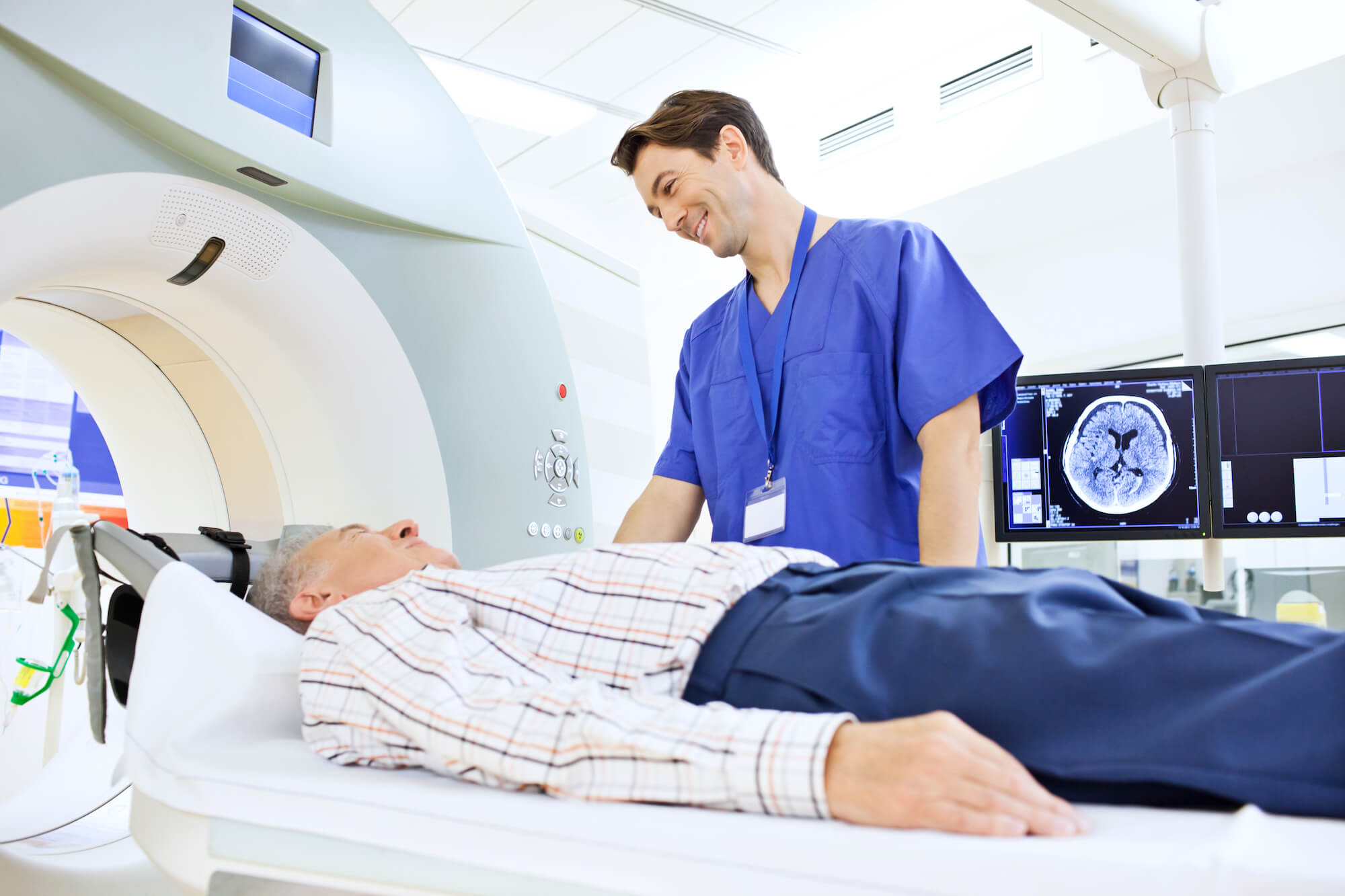The Test You Need to Prevent a Heart Attack
Calcium is a natural part of the body, but sometimes it appears in places where it shouldn’t.
When plaque builds up in the arteries, it can calcify over time and block the flow of blood, which leads to a heart attack.
A coronary calcium scan is a relatively new and accurate test used to determine the blockages of arteries in the heart. This knowledge can significantly reduce the risk of having a heart attack.

Coronary Calcium Scan
Calcium deposits usually begin to form years before any symptoms develop.
A coronary calcium scan uses computerized tomography (CT) to detect calcium deposits in the coronary arteries of your heart, potentially years before a standard exercise stress test could detect disease. The amount of calcified plaque is correlated with the patient’s additional risk factors to obtain the necessary information to chart a proactive treatment.
Calcium deposits do not correspond directly to the percentage of narrowing of the arteries. They do, however, correlate directly to the amount of coronary plaque and to the risk of future coronary disease.
Early Detection of Coronary Artery Disease
What Your Calcium Score Means
- 0: No evidence of calcified coronary plaque
- 1-10: Minimal
- 11-100: Mild
- 101-300: Moderate
- 301 and higher: Severe
Benefits of a Coronary Calcium Scan
Prevention of Heart Attacks
The main benefit of a coronary calcium scan is that it can detect whether there is plaque build-up in your coronary arteries, which helps evaluate if you are at increased risk for heart attack.
Plaque is made up of fats, cholesterol, calcium and other substances in the blood. It develops gradually over time, long before there are any signs or symptoms of disease. These deposits can restrict the flow of oxygen-rich blood to the muscles of the heart.
Plaque may also burst, triggering a blood clot that can cause a myocardial infarction. Detecting plaque early is crucial for preventing a heart attack.
Does Not Require Injection of Contrast Material
Contrast material refers to any internally administered substance that helps show abnormal areas inside the body. It is injected into a vein or by mouth, and is typically used with x-rays, CT scans, MRIs, or other imaging tests.
However, with coronary calcium scans, no contrast material is required. This makes the procedure simple and convenient, and also does not provide patients with any pain during the scan.
No Immediate Side Effects

Don’t become a statistic.
Invest now in your future health and be fit for the long term.
How A Coronary Calcium Scan Works
Preparing For the Scan
During the Procedure
Results of the Scan
=An absence of calcium is considered a "negative" exam. However, it does not exclude the presence of "soft" non-calcified plaque.
If calcium is present, the computer will create a calcium score that estimates the extent of coronary artery disease.

Reasons to Get a Coronary Calcium Scan
Provides a Better Understanding of Your Risk of Heart Disease
Helps You Develop a Better Treatment Plan
Convenient and Non-Invasive Procedure
Packages
Invest-Med offers thorough health packages designed to meet the individual needs of our patients.
You can choose between a risk-specific package or a comprehensive package to analyze your health and wellbeing.
Our health packages include rapid access to diagnostic testing using state-of-the-art technology, searching for 500+ diseases in the body, including cancer and heart disease.
Each package includes a comprehensive 1 hour physical exam and 1 hour medical review of results with recommendations to achieve optimal health.
Package costs will vary based on individual diagnostic test recommendations. Financing options are available.
Private MRI Health Packages
Full-Body MRI + Metabolic Blood Panel
Package starting at $5,699*
A Full-Body MRI proactively searches for 500 diseases lurking inside the body.
This package evaluates of overall metabolic efficiency by analyzing of a comprehensive range of biomarkers.
- Advanced lipid profiles
- Insulin resistance
- Indicators of inflammation
- Key measures of organ function
All Private MRI packages also include:
- Physician read results
- Long term plan of action
- Ongoing care with referrals
*Package cost will vary based on individual diagnostic test recommendations. Financing options are available.
Full-Body MRI + Cardiac Blood Panel
Package starting at $5,699*
A Full-Body MRI proactively scans the entire body to detect up to 500 hidden diseases.
A series of assessments used to evaluate cardiovascular health.
- Assessment of heart function indicators
- Measurement of cholesterol levels
- Measurement of triglycerides
- Evaluation of key inflammation markers
All Private MRI packages also include:
- Physician read results
- Long term plan of action
- Ongoing care with referrals
*Package cost will vary based on individual diagnostic test recommendations. Financing options are available.
Full-Body MRI + Hormone Blood Panel
Package starting at $5,699*
A Full-Body MRI scan can identify over 500 potential health conditions within the body.
A comprehensive evaluation of overall hormonal health and balance with an in-depth analysis of key hormones.
- Thyroid hormones
- Cortisol and other adrenal hormones
- Estrogen, progesterone, and testosterone
- Insulin levels
All Private MRI packages also include:
- Physician read results
- Long term plan of action
- Ongoing care with referrals
*Package cost will vary based on individual diagnostic test recommendations. Financing options are available.
Full-Body MRI + All 3 Blood Panels
Packages starting at $6,999*
All Private MRI packages also include:
- Physician read results
- Long term plan of action
- Ongoing care with referrals
*Package cost will vary based on individual diagnostic test recommendations. Financing options are available.
Risk-Specific Screening Packages
Cancer Screening Package
Mitigate your cancer risk with preventive screening.
- MRI
- DNA testing – 84 genes for cancer
- Mole mapping
- Advanced blood work
- CT scan
- Virtual colonoscopy
Proactive testing can detect changes in your body that could become cancer.
*Package prices range from $3,999 to $14,999.
Package cost will vary based on individual diagnostic test recommendations. Financing options are available.
Stroke Screening Package
Knowing your risk for stroke can save your life.
- MRA – Magnetic resonance angiography
- DNA testing – 83 genes for heart conditions
- Advanced blood work
- Carotid doppler ultrasound
- Echocardiogram
Detect your risk of stroke early, even before symptoms present themselves.
*Package prices range from $3,999 to $14,999.
Package cost will vary based on individual diagnostic test recommendations. Financing options are available.
Heart Disease Screening Package
Early screenings are essential for heart disease prevention.
- Coronary calcium score
- DNA testing – 83 genes for heart conditions
- Advanced blood work
- Exercise stress test
- Echocardiogram
- CT coronary angiography
Screening for cardiovascular risk factors before you develop heart disease, can help you prevent it.
*Package prices range from $3,999 to $14,999.
Package cost will vary based on individual diagnostic test recommendations. Financing options are available.
Comprehensive Screening Packages
Comprehensive Screening Package
Get the right screening tests at the right time.
- Whole body MRI
- Coronary calcium score
- DEXA scans
- Microbiome gut testing
- Genetic testing+
- Heart health workup
- Cancer risk review
- Mole mapping
- Screen for all material risks
Prevention is key to longevity, whether or not you are presenting symptoms or risk factors.
*Package prices range from $3,999 to $14,999.
Package cost will vary based on individual diagnostic test recommendations. Financing options are available.
Corporate Services
Please contact us for a custom corporate package. Specialized corporate rates available.
- Comprehensive, proactive health plans
- Customized screening tests
- Extensive medical risk assessments
- Preventive approach to healthcare
Proactively manage executive wellness.
FAQ
Who should get a coronary calcium scan?
People at increased risk for heart disease should consider getting a coronary calcium scan, including those with the following traits:
- Family history of heart disease
- Past or present smoker
- History of high cholesterol, high blood pressure, or diabetes
- Overweight
- Inactive lifestyle
How long does a coronary calcium scan take?
How can I prepare for a coronary calcium scan?
What should I expect after the scan?
Can I still get a coronary calcium scan even if I am pregnant?
When is a coronary calcium scan used?
A coronary calcium scan may help guide treatment if you have a low to moderate risk of heart disease, or if your heart disease risk is not clear. Your doctor can tell you if you might benefit from having a heart scan based on your risk factors.
A coronary calcium scan may also help motivate people at moderate risk to make important lifestyle changes and follow treatment plans.
Learn More
